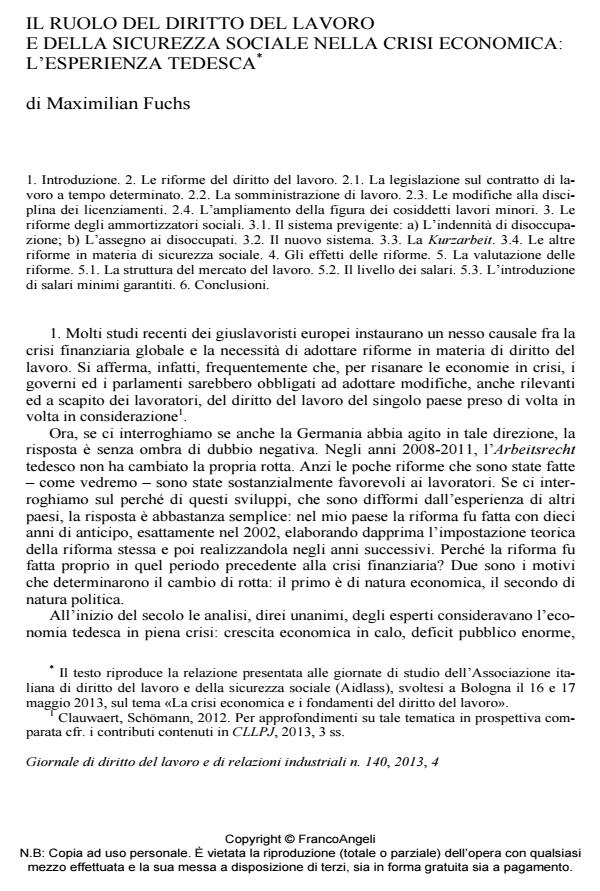Il ruolo del diritto del lavoro e della sicurezza sociale nella crisi economica: l’esperienza tedesca
Journal title GIORNALE DI DIRITTO DEL LAVORO E DI RELAZIONI INDUSTRIALI
Author/s Maximilian Fuchs
Publishing Year 2013 Issue 2013/140
Language Italian Pages 14 P. 741-754 File size 274 KB
DOI 10.3280/GDL2013-140011
DOI is like a bar code for intellectual property: to have more infomation
click here
Below, you can see the article first page
If you want to buy this article in PDF format, you can do it, following the instructions to buy download credits

FrancoAngeli is member of Publishers International Linking Association, Inc (PILA), a not-for-profit association which run the CrossRef service enabling links to and from online scholarly content.
When we identify the global economic crisis with the years from 2008 to 2011 and ask for the impact of this crisis upon the German labour and social security law, we learn that changes in law were rather modest. The reason for this is that in Germany a big reform package was put into practice much earlier in the years 2003-2005. These farreaching reforms (often referred to as Hartzreforms or Agenda 2010) aimed mainly at the creation of a suitable legal framework for the labour market in order to improve a disastrous situation of the economy. As far as labour law was concerned legal barriers for Temporary Agency Work were removed, so-called minor employment was stimulated and the exemption of small enterprises (up to 10 employees) from the Act on dismissals was provided for. In the arena of social security the reduction of ancillary labour costs (social security contributions) had priority, realized by interventions into health and pension insurance to the detriment of employees. The most far-reaching step was the reform of unemployment benefits. Unemployment insurance was maintained (with conditions for claims aggravated) but the second pillar of the scheme was abolished and instead a system introduced along the lines of social assistance which should motivate people to accept low-paid jobs. And the extension of the short-time work scheme was very effective. The success of all these reforms is out of question if the yardstick is the employment rate. The flipside of these developments is the significant decline of the salary level for many workers. A broad majority of the political class did no longer accept that incomes from full-time jobs did not suffice to earn a living. As a consequence minimum wages in vulnerable sectors of industry and services were introduced in the middle of the economic crisis. These measures may have a mitigating effect for people concerned, but the problem of the extremely unequal distribution of income and wealth remains on the political agenda.
Keywords: Temporary agency work; Law of dismissal; Short-time work; Reduction of ancillary wage costs; Reform of unemployment benefits; Minimum wages.
- Kokemoor A. (2003). Neuregelung der Arbeitnehmerüberlassung durch die Hartz-Umsetzungsgesetze. NZA, p. 238 ss.
- Löwisch M. (2009). Die neue Mindestlohngesetzgebung. RdA, p. 215 ss.
- Meinel G. (2003). Agenda 2010 – Regierungsentwurf zu Reformen am Arbeitsmarkt. DB, p. 1438 ss.
- Nebe K. (2013). Spaltung des Arbeitsmarktes durch Krisengesetzgebung – eine kritische Analyse des deutschen Arbeits- und Sozialrechts vor und nach der Krise. SR, p. 1 ss.
- Petrak T. (2010). Kurzarbeit. NZA, p. 44 ss.
- Santagata R. (2012). Il recente dibattito dottrinale e giurisprudenziale sui licenziamenti nel diritto tedesco. Parte prima. DLM, p. 543 ss.
- Santagata R. (2013). Il recente dibattito dottrinale e giurisprudenziale sui licenziamenti nel diritto tedesco. Parte seconda. DLM, n. 1 (in corso di pubblicazione).
- Sittard U. (2009). Neue Mindestlohngesetze in Deutschland. NZA, p. 346 ss.
- Stiglitz J. (2012). The Price of Inequality. New York: W.W. Norton & Co.
- Stiglitz J. (2013). Il prezzo della disuguaglianza. Torino: Einaudi.
- Zimmermann K. (2008). Die Agenda 2010: Ein geschichtsträchtiger gesellschaftspolitischer Reformaufbruch. Wirtschaftsdienst (WD), p. 170 ss.
- Clauwaert S., Schömann I. (2012). The crisis and national labour law reforms. A mapping exercise. ELLJ, p. 54 ss.
- Faber M. (2005). Das neue SGB II – eine Lösung des Problems der Langzeitarbeitslosigkeit. NZS, p. 75 ss.
- Fuchs M. (2009). Das Gleichbehandlungsgebot in der Leiharbeit nach der neuen Leiharbeitsrichtlinie. NZA, p. 57 ss.
- Fuchs M. (2010). Le politiche attive del lavoro nella Repubblica Federale. In: Lagala C., a cura di, Politiche di attivazione dei disoccupati in Europa. Roma: Ediesse, p. 169 ss.
- Fuchs M. (2011). La lunga storia del caso Mangold. DLRI, p. 81 ss.
- Fuchs M., Manske O. (2010). Gleichbehandlungsgebot und Tarifvertragspraxis in der Leiharbeit.
- In: Dieterich T, Le Friant M., Kezuka K., Nogler L., Pfarr H., Hrg., Individuelle und Kollektive Freiheit im Arbeitsrecht, Gedächtnisschrift für Ulrich Zachert. Baden-Baden: Nomos, p. 249 ss.
- Hanau P. (1996). Das Arbeitnehmer-Entsendegesetz. NJW, p. 1369 ss.
- Kalina T., Weinkopf C. (2012). Niedriglohnbeschäftigung 2010: Fast jede/r Vierte arbeitet für Niedriglohn. Testo disponibile al sito: http://www.iaq.uni-due.de/iaq-report/2012/report2012-01.php (consultato il 23.9.2013).
Maximilian Fuchs, Il ruolo del diritto del lavoro e della sicurezza sociale nella crisi economica: l’esperienza tedesca in "GIORNALE DI DIRITTO DEL LAVORO E DI RELAZIONI INDUSTRIALI " 140/2013, pp 741-754, DOI: 10.3280/GDL2013-140011